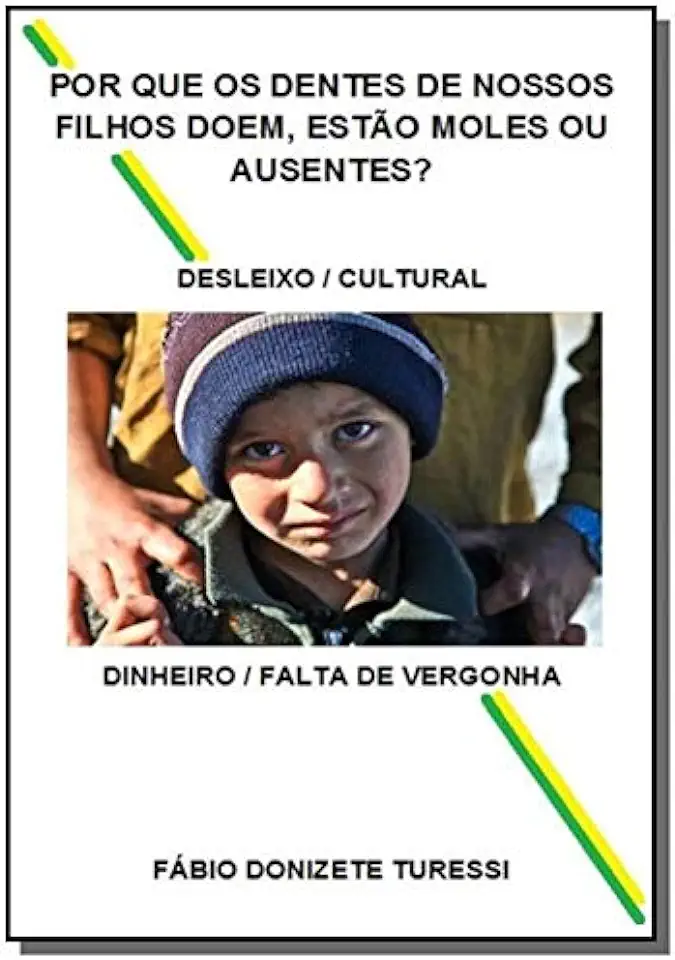
WHY DO OUR CHILDREN'S TEETH HURT, ARE LOOSE OR MISSING? - FÁBIO DONIZETE TURESSI
Why Do Our Children's Teeth Hurt, Are Loose or Missing?
A Comprehensive Guide to Children's Oral Health
By Fábio Donizete Turessi
Introduction
As a parent, you want what is best for your child. That includes their oral health. But what happens when your child starts complaining of tooth pain, or you notice their teeth are loose or missing? It can be a scary and confusing time.
In his book, "Why Do Our Children's Teeth Hurt, Are Loose or Missing?", Dr. Fábio Donizete Turessi provides a comprehensive guide to children's oral health. He covers everything from the causes of tooth pain and loose teeth to the importance of preventive care.
What Causes Tooth Pain in Children?
There are many different things that can cause tooth pain in children. Some of the most common causes include:
- Cavities: Cavities are the most common cause of tooth pain in children. They are caused by bacteria that feed on the sugars in food and drink. These bacteria produce acids that attack the teeth, causing them to decay.
- Gum disease: Gum disease is another common cause of tooth pain in children. It is caused by bacteria that build up on the teeth and gums. This bacteria can cause the gums to become inflamed and bleed.
- Trauma: Tooth pain can also be caused by trauma, such as a fall or a blow to the mouth. Trauma can damage the teeth or the gums, causing pain.
- Other medical conditions: Some medical conditions, such as ear infections and sinus infections, can also cause tooth pain.
What Causes Loose Teeth in Children?
There are also many different things that can cause loose teeth in children. Some of the most common causes include:
- Normal development: Baby teeth are naturally loose and will eventually fall out to make way for permanent teeth.
- Gum disease: Gum disease can also cause teeth to become loose. This is because the bacteria that cause gum disease can damage the bone that supports the teeth.
- Trauma: Trauma can also cause teeth to become loose. This is because trauma can damage the teeth or the gums, which can lead to the teeth becoming loose.
- Other medical conditions: Some medical conditions, such as certain types of cancer, can also cause teeth to become loose.
What Causes Missing Teeth in Children?
There are also many different things that can cause missing teeth in children. Some of the most common causes include:
- Tooth decay: Tooth decay is the most common cause of missing teeth in children. This is because cavities can eventually lead to the tooth becoming so damaged that it needs to be extracted.
- Gum disease: Gum disease can also lead to missing teeth. This is because the bacteria that cause gum disease can damage the bone that supports the teeth.
- Trauma: Trauma can also cause teeth to become missing. This is because trauma can damage the teeth or the gums, which can lead to the teeth becoming loose and eventually falling out.
- Other medical conditions: Some medical conditions, such as certain types of cancer, can also cause teeth to become missing.
The Importance of Preventive Care
The best way to protect your child's oral health is to practice preventive care. This includes:
- Brushing your child's teeth twice a day with a soft-bristled toothbrush and fluoride toothpaste.
- Flossing your child's teeth once a day.
- Taking your child to the dentist for regular checkups and cleanings.
- Limiting your child's intake of sugary foods and drinks.
By following these tips, you can help your child maintain a healthy smile for life.
Conclusion
"Why Do Our Children's Teeth Hurt, Are Loose or Missing?" is a valuable resource for parents who want to protect their children's oral health. Dr. Turessi provides a wealth of information on the causes of tooth pain, loose teeth, and missing teeth, as well as the importance of preventive care. This book is a must-read for any parent who wants to ensure their child has a healthy smile.